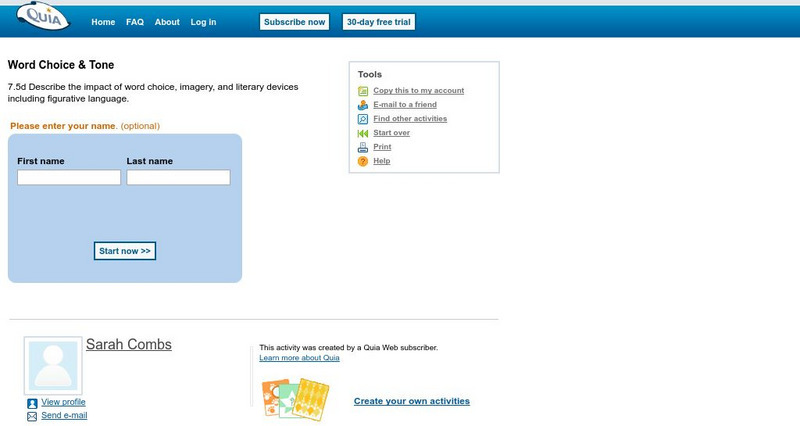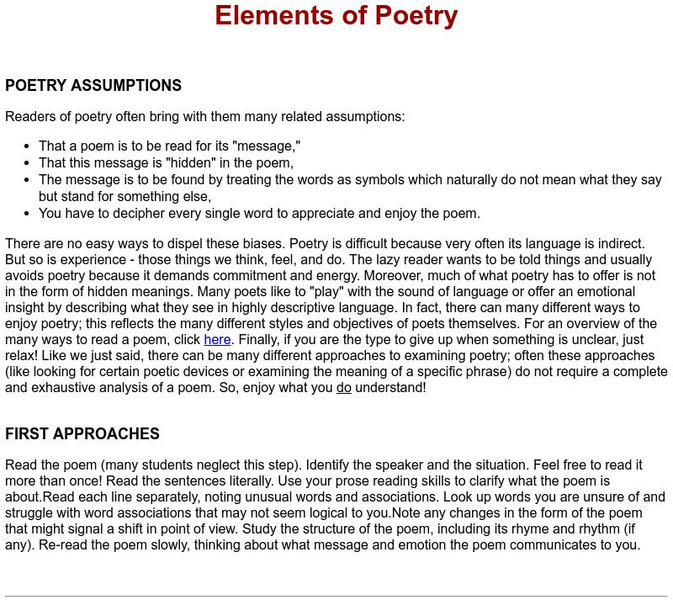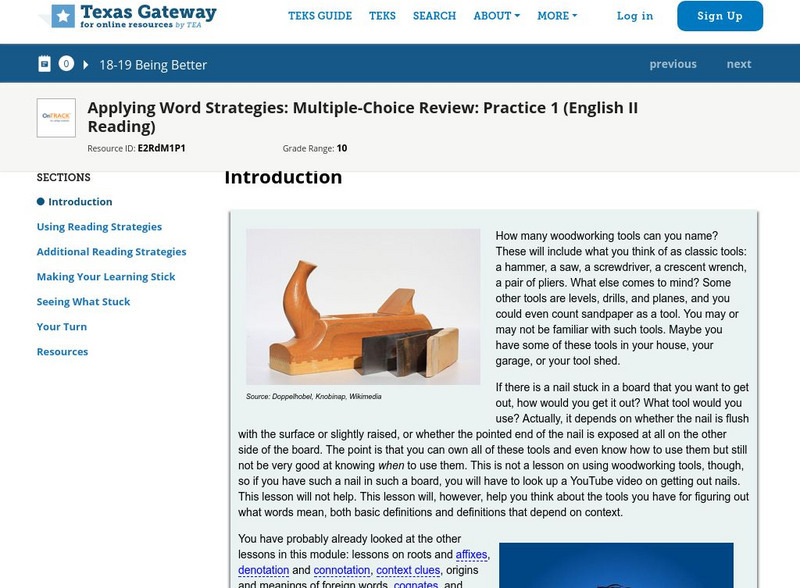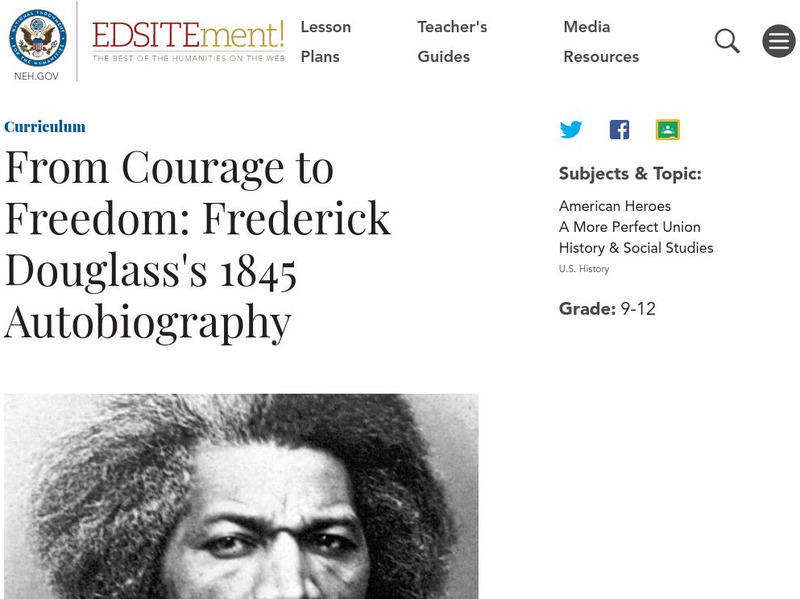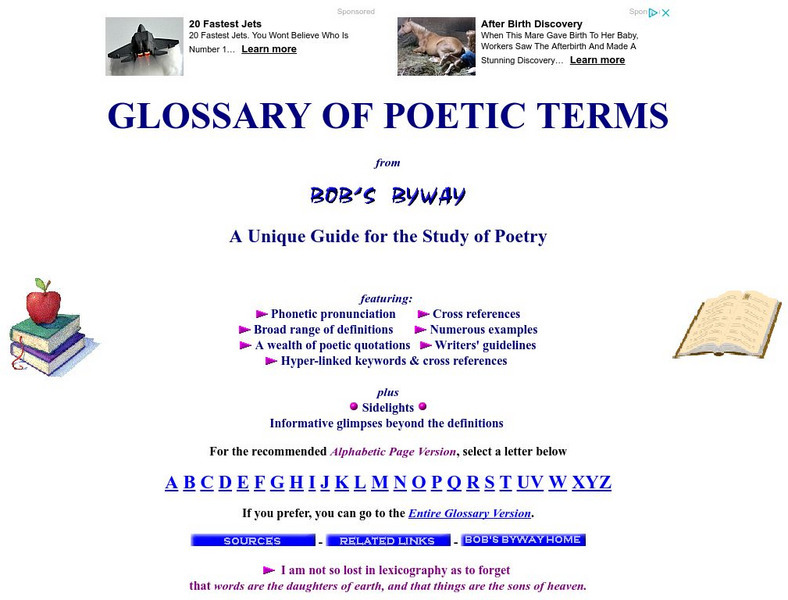Hi, what do you want to do?
Towson University
Towson University: Ows: Commonly Confused Words: Connote / Denote
This entry focuses on the commonly confused words connote and denote including providing an explanation, examples, and a link to a quiz/exercise.
TED Talks
Ted: Ted Ed: How Did English Evolve?
This lesson focuses on the evolution of the English language. What is the difference between "a hearty welcome" and "a cordial reception"? In a brief, action-packed history of the English language video, Kate Gardoqui explains why these...
Ted Nellen
Cyber English (By Ted Nellen): Denotation
Brief definition of the term denotation provided. Several examples given and a link to the term connotation provided.
Other
Prezi: Tone, Diction, and Analysis of Word Choice
Slideshow explores the connection between word choice and the author's tone.
Towson University
Towson University: Ows: Connote / Denote Exercise 1
This is a 10-question, self-grading practice/quiz for the commonly confused words Connote and Denote.
Towson University
Towson University:ows: Connote / Denote Exercise 2
This is a 10-question, self-grading practice/quiz for the commonly confused words Connote and Denote.
Polk Brothers Foundation Center for Urban Education at DePaul University
De Paul University: Center for Urban Education: Can Infer Meaning of a Multiple Meaning [Pdf]
Students will analyze a word in several different sentences. Students will determine the meaning of the same word in several different contexts. Students will also write their own sentences with the same word in several different contexts.
Alabama Learning Exchange
Alex: A Gift for Mom and Dad
Following a reading of O. Henry's "Gift of the Magi," young scholars write an expository essay based on the connotative definition of "gift." The essay is then presented as a holiday gift. The lesson can be adapted to a variety of...
Quia
Quia: Word Choice and Tone Quiz
This interactive series of questions assesses students' understanding of the impact of word choice on the tone of a passage. Students will identify the correct tone used in sentences, paragraphs, and poems.
Other
Lexiconic.net: Elements of Poetry
This resource explains how to approach an analysis of a poem. It discusses assumptions people may have, the importance of reading it closely before analyzing it, looking at the stanza structure, the type of poem, the sound patterns,...
Texas Education Agency
Texas Gateway: Applying Word Strategies: Multiple Choice Review: Practice 1
Lessons on roots and affixes, denotation and connotation, context clues, origins and meanings of foreign words, cognates, and reference materials help determine word meanings. These lessons told you HOW to use these word discovery tools....
Texas Education Agency
Texas Gateway: Applying Word Study Strategies (English I Reading)
Apply previous lessons, (1) Linguistic Roots and Affixes, (2) Denotation and Connotation, (3) Origins and Meanings of Foreign Words, (4) Cognates, and (5) Reference Materials, to improve fluency and comprehension.
National Endowment for the Humanities
Neh: Edsit Ement: From Courage to Freedom:frederick Douglass's 1845 Autobiography
In this 3-lesson unit, students will read Douglass's narrative. They will analyze Douglass's vivid first-hand accounts of the lives of slaves and the behavior of slave owners to see how he successfully contrasts reality with romanticism...
Other
Bob's Byway: Glossary of Poetic Terms
Calling itself "unique," Bob's is easy to use, with cross-links throughout, phonetic pronunciation guides when necessary, and many examples and quotations. Click on the letter and scroll for the word.
Towson University
Towson University: Ows: Commonly Confused Words: Continual / Continuous
This entry focuses on the commonly confused words continual and continuous including providing an explanation, examples, and a link to a quiz/exercise.
Beacon Learning Center
Beacon Learning Center: Did I Read?
Explicit and implicit information are reviewed in this lesson. Students will choose a part of the body and then read a short passage that explains what it does. Students will answer three questions over the passage and then determine...
University of Victoria (Canada)
The U Vic Writer's Guide: General Literary Terms
The University of Victoria's Writer's Guide includes an extensive list of literary and rhetorical terms. List can be displayed alphabetically.
Ted Nellen
Cyber English (By Ted Nellen): Euphemism
This is a glossary entry for the term "Euphemism" including a definition and examples. L.9-10.5a Figures of Speech
TES Global
Tes: Varieties of English
[Free Registration/Login Required] This graphic organizer will help student reflect on the similarities and difference among formal and informal word choices. Dialect, idiolect, and verb effectiveness are featured.
CK-12 Foundation
Ck 12: 6.1 Writing About Literature: Analyzing Prose
[Free Registration/Login may be required to access all resource tools.] Learn to analyze prose by understanding connotation and denotation, identifying metaphors and similes, looking for repetition, and finding imagery in a text.











![De Paul University: Center for Urban Education: Can Infer Meaning of a Multiple Meaning [Pdf] Unknown Type De Paul University: Center for Urban Education: Can Infer Meaning of a Multiple Meaning [Pdf] Unknown Type](https://static.lp.lexp.cloud/images/attachment_defaults/resource/large/FPO-knovation.png)

